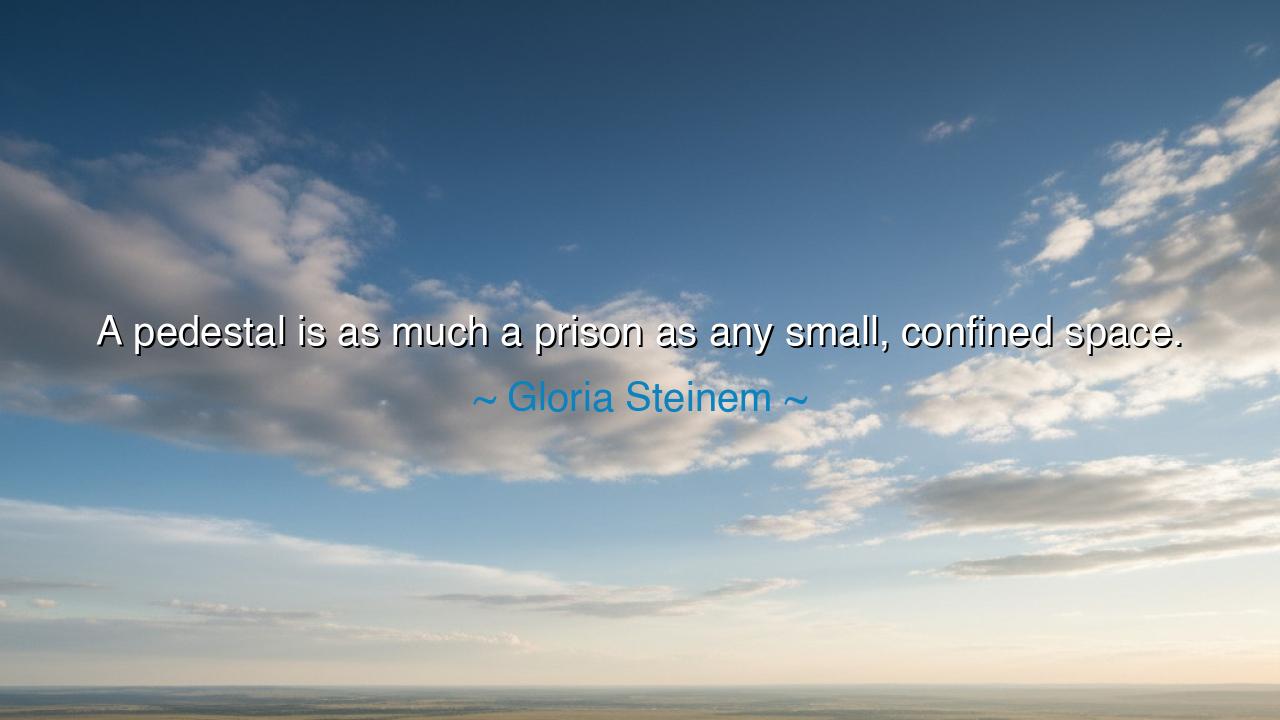
A pedestal is as much a prison as any small, confined space.






Gloria Steinem, warrior of words and liberator of voices, declared with piercing truth: “A pedestal is as much a prison as any small, confined space.” These words, though simple, are as sharp as a chisel striking stone, breaking open illusions long revered. They warn that to be placed upon a pedestal—praised, idealized, glorified—is not always an honor, but often a hidden cage. For though the pedestal lifts one high, it also binds them to expectation, denying their freedom to live as they truly are.
The meaning of Steinem’s words flows from the struggle of women across centuries. For ages, women were not merely oppressed by chains of weakness, but by chains of praise. Called angels of the home, pure vessels of virtue, or delicate flowers too fragile for the world, they were exalted, but their pedestal was their prison. To be told one is above the dust is to be forbidden from walking upon the earth. To be crowned with impossible virtue is to be denied the full humanity of error, struggle, passion, and choice. Thus, the gilded pedestal becomes no less confining than iron bars.
History offers clear testimony. In Victorian England, women were celebrated as the “angels in the house.” They were placed upon pedestals of purity, expected to embody chastity, obedience, and endless sacrifice. But in this exaltation, they were barred from education, from political power, from their own ambitions. Florence Nightingale, though revered today, once raged against this confinement. She longed to heal, to serve, to labor, but society told her such work was beneath a lady. Her greatness only emerged when she broke the pedestal, stepping into the blood and dirt of war to tend the wounded. In doing so, she proved Steinem’s truth: the pedestal is no less a prison.
The same pattern appears in modern times, when leaders, artists, or thinkers are raised too high. The hero who is worshiped cannot stumble, cannot doubt, cannot be flawed. Yet all humans stumble, doubt, and fail. To demand perfection of them is to rob them of their humanity, to confine them in a space where the fear of falling is constant. Many a soul has been crushed beneath the weight of adoration. Thus, the pedestal is not a blessing but a burden, its stone walls invisible yet suffocating.
Steinem’s words are also a call to vigilance. When you find yourself praised beyond reason, be wary. For praise can be as dangerous as censure. To be told you are flawless is to be denied the right to grow. To be told you are sacred is to be denied the freedom to live fully as human. Do not let the pedestal seduce you, for it is a prison gilded with admiration. Better to walk humbly on the ground, with freedom in your step, than to stand high and motionless, bound by chains of expectation.
O children of tomorrow, learn this: do not imprison others with your worship. To honor someone is good, but to freeze them in perfection is cruel. See your leaders, your loved ones, your companions as whole beings—capable of greatness, but also of frailty. True love, true respect, true reverence allows for both the light and the shadow, both triumph and failure. Only in this balance can freedom endure.
Therefore, the lesson is this: reject the false gift of the pedestal. Seek instead the solid ground of truth, where people are free to live, to err, to change. If you are lifted too high, step down. If you are tempted to lift another beyond humanity, hold back. For pedestals are but prisons, and prisons, no matter how lofty, are not the dwelling places of a free soul.
Thus, Steinem’s words endure as a warning and a guide. To live freely, one must break the pedestal, shatter the cage of impossible praise, and walk the earth as a full human being. Only then can the spirit breathe, and only then can the chains of false honor be cast away.






AAdministratorAdministrator
Welcome, honored guests. Please leave a comment, we will respond soon